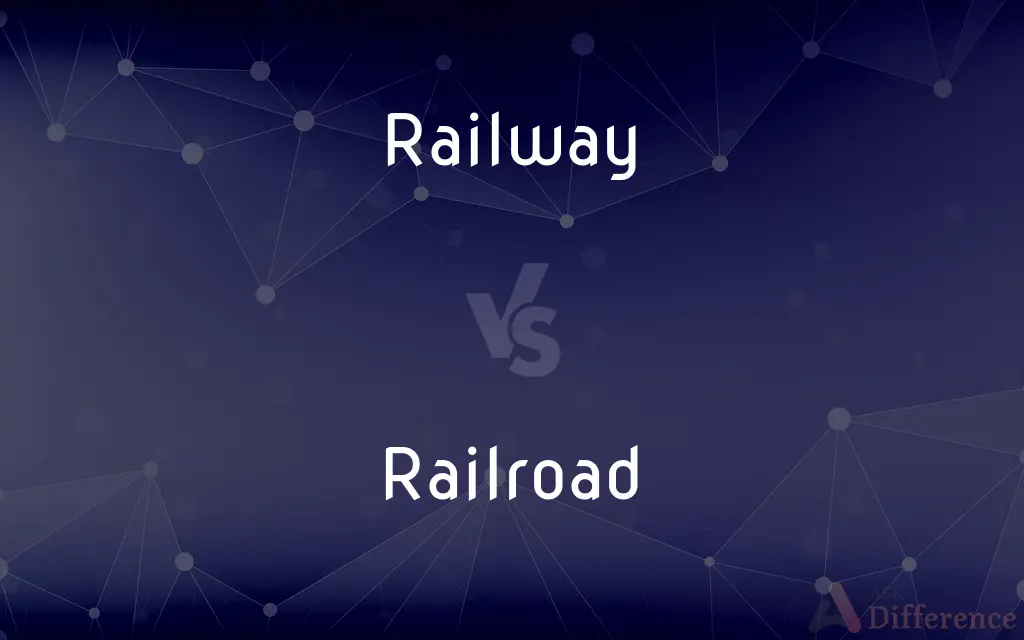Railway vs. Railroad — What's the Difference?
By Tayyaba Rehman — Updated on September 22, 2023
Railway and railroad both refer to a track for trains but are used differently regionally; railway is common in British English, while railroad is used in American English.

Difference Between Railway and Railroad
Table of Contents
ADVERTISEMENT
Key Differences
Railway and railroad are terms often used interchangeably to describe a system of tracks upon which trains run. Railways, a term more commonly used in British English, encompasses not only the tracks but also the trains, buildings, and other adjunct operations involved in train travel. It typically implies a complex system, inclusive of the entire infrastructure and services related to train transport, and denotes both the entity providing train service and the tracks on which trains run.
Railroad, predominantly an American English term, also implies the entire system of tracks, trains, and related structures. Like the term railway, it represents the comprehensive system that includes all aspects, from tracks to trains to the companies operating them. It tends to be the favored term when discussing train travel and infrastructure in the United States, emphasizing the act of conveyance and the road on which it occurs.
While the terms railway and railroad both refer to the track system and are generally used interchangeably, regional preferences and nuances exist. The term railway tends to be more encompassing, focusing on the system as a whole, and is widely used in international contexts and discussions about train systems in British English-speaking regions. It may convey a sense of formality and historical depth, considering the longstanding tradition of train travel in many parts of the world.
On the other hand, the term railroad, firmly entrenched in American English, underscores the physical path and the operation of running trains on it. It is ingrained in the American vernacular, evoking images of the extensive network of tracks that played a pivotal role in the nation’s development and expansion. The choice between railway and railroad is largely influenced by regional dialects and the cultural and historical context in which the terms are used.
Comparison Chart
Regional Usage
More common in British English.
Predominantly used in American English.
ADVERTISEMENT
Connotation
May imply a formal and historical system of train transport.
Emphasizes the path and the operation of running trains.
Scope
Encompasses the tracks, trains, and related structures.
Generally refers to the entire system of train transport.
International Use
Widely used in international contexts.
Less commonly used in international railway discussions.
Infrastructural Focus
Includes entity providing service and the tracks.
Emphasizes the tracks and the act of conveyance.
Compare with Definitions
Railway
A railway is a track made of steel rails along which trains run.
The railway connects the two major cities efficiently.
Railroad
A railroad is a set of tracks with a road of parallel steel rails for train transport.
The railroad traverses through scenic landscapes.
Railway
It refers to the entire system of organization and apparatus for train transport.
The new high-speed railway has significantly reduced travel time.
Railroad
It is used to describe the conveyance of passengers and goods by trains.
The freight railroad transports goods across the country efficiently.
Railway
A railway is a company that operates trains.
The national railway ensures safe and timely journeys for passengers.
Railroad
A road composed of parallel steel rails supported by ties and providing a track for locomotive-drawn trains or other wheeled vehicles.
Railway
It can refer to the group of lines and stations in a particular area.
The local railway has been upgrading its facilities.
Railroad
A system of railroad track, together with the land, stations, rolling stock, and other related property under one management.
Railway
A railroad, especially one operated over a limited area
A commuter railway.
Railroad
To transport by railroad.
Railway
A track providing a runway for wheeled equipment.
Railroad
To supply (an area) with railroads.
Railway
A transport system using rails used to move passengers or goods.
Railroad
To rush or push (something) through quickly in order to prevent careful consideration and possible criticism or obstruction
Railroad a special-interest bill through Congress.
Railway
A track, consisting of parallel rails, over which wheeled vehicles such as trains may travel.
Railroad
To convict (an accused person) without a fair trial or on trumped-up charges.
Railway
Line that is the commercial organization responsible for operating a railway system
Railroad
To work for a railroad company.
Railway
A line of track providing a runway for wheels;
He walked along the railroad track
Railroad
A permanent track consisting of fixed metal rails to drive trains or similar motorized vehicles on.
Many railroads roughly follow the trace of older land - and/or water roads
Railway
A railway is the service of transporting goods and people by train.
The development of the railway revolutionized trade and travel.
Railroad
The transportation system comprising such tracks and vehicles fitted to travel on the rails, usually with several vehicles connected together in a train.
Railroad
A single, privately or publicly owned property comprising one or more such tracks and usually associated assets
Railroads can only compete fully if their tracks are technically compatible with and linked to each-other
Railroad
(figuratively) A procedure conducted in haste without due consideration.
The lawyers made the procedure a railroad to get the signatures they needed.
Railroad
(transitive) To transport via railroad.
Railroad
(intransitive) To operate a railroad.
The Thatcherite experiment proved the private sector can railroad as inefficiently as a state monopoly
Railroad
(intransitive) To work for a railroad.
Railroad
(intransitive) To travel by railroad.
Railroad
(intransitive) To engage in a hobby pertaining to railroads.
Railroad
(transitive) To manipulate and hasten a procedure, as of formal approval of a law or resolution.
The majority railroaded the bill through parliament, without the customary expert studies which would delay it till after the elections.
Railroad
(transitive) To convict of a crime by circumventing due process.
They could only convict him by railroading him on suspect drug-possession charges.
Railroad
(transitive) To procedurally bully someone into an unfair agreement.
He was railroaded into signing a non-disclosure agreement at his exit interview.
Railroad
(role-playing games) To force characters to complete a task before allowing the plot to continue.
Railroad
(upholstery) To run fabric horizontally instead of the usual vertically.
Railroad
A road or way consisting of one or more parallel series of iron or steel rails, patterned and adjusted to be tracks for the wheels of vehicles, and suitably supported on a bed or substructure.
Railroad
The road, track, etc., with all the lands, buildings, rolling stock, franchises, etc., pertaining to them and constituting one property; as, a certain railroad has been put into the hands of a receiver.
Railroad
To carry or send by railroad; usually fig., to send or put through at high speed or in great haste; to hurry or rush unduly; as, to railroad a bill through Condress.
Railroad
Line that is the commercial organization responsible for operating a railway system
Railroad
A line of track providing a runway for wheels;
He walked along the railroad track
Railroad
Compel by coercion, threats, or crude means;
They sandbagged him to make dinner for everyone
Railroad
Supply with railroad lines;
Railroad the West
Railroad
Transport by railroad
Railroad
It represents the company or system that operates train service.
The local railroad has introduced new, modern trains.
Railroad
A railroad can mean the entire infrastructure and vehicles for train operation.
The expansion of the railroad played a vital role in the nation’s development.
Railroad
A railroad can refer to a track laid in a mine or forest area for transporting coal or timber.
The narrow-gauge railroad was built to transport timber to the mill.
Common Curiosities
Are there differences in the infrastructure of a railway and a railroad?
The infrastructure is essentially the same; the difference lies mainly in terminology.
Can railroad refer to the company operating the trains?
Yes, railroad can refer to both the train operating company and the track system.
Is railway primarily about the tracks?
Railway refers to both the tracks and the entire system related to train transport.
Are railways and railroads mainly for passenger transport?
They serve for both passenger and freight transport.
Is railroad a more modern term than railway?
Both terms have historical roots; the choice of term is more about regional preference than modernity.
Can railway refer to a small local line?
Yes, the term railway can refer to both large and small train transport systems.
Are the terms railway and railroad synonymous?
Yes, they are generally synonymous but are used differently regionally.
Can the term railway be used in American English?
Yes, it can be used and understood, but railroad is more common in American English.
Do all countries have railways or railroads?
Most countries have some form of train transport, be it a railway or railroad.
Is railway used more internationally?
Yes, railway is more commonly used in international and British English contexts.
Share Your Discovery

Previous Comparison
Oarlock vs. Thole
Next Comparison
Eligible vs. IllegibleAuthor Spotlight
Written by
Tayyaba RehmanTayyaba Rehman is a distinguished writer, currently serving as a primary contributor to askdifference.com. As a researcher in semantics and etymology, Tayyaba's passion for the complexity of languages and their distinctions has found a perfect home on the platform. Tayyaba delves into the intricacies of language, distinguishing between commonly confused words and phrases, thereby providing clarity for readers worldwide.
















































